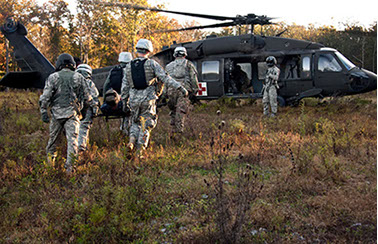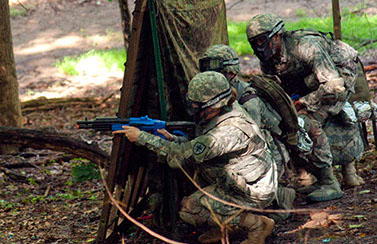PRE-HOSPITAL ASSESSMENT AND STABILIZATION
Whether it’s treating patients in a dark, smoky room simulating a recent explosion, or in the woods while being bombarded with paintballs, Advanced Combat Medical Experience (ACME) is sure to put students in a situation they aren’t familiar with. And that’s the point.
Since 2013, ACME has been one of the ways we address the need for critical, fast-paced combat medical readiness skills. The course, for second-year medical students in the School of Medicine, develops and reinforces the knowledge, skills, and attitudes necessary to perform effective pre-hospital assessment and stabilization of combat wounded casualties. The course teaches medical students the life-saving knowledge and skills of tactical combat casualty care, while educating them about their responsibility as future military medical leaders to ensure excellent care for wounded warriors at the point of injury.
Students work in teams of four to provide medical care to volunteers wearing cut suits portraying wounded patients. The advanced human-worn simulators give students the ability to perform real procedures, such as IV insertion and tracheostomies, on live subjects without actually touching the “patients.” Faculty and staff instructors evaluate each team, grading them on their abilities to not only treat casualties under fire, but also to prevent further casualties, and complete the mission.
The ACME course continues to evolve as new technology and techniques become available, such as Go Pro camera observation of resuscitations, allowing for better self-evaluation and team evaluation of the resuscitations, and paintball as a means of teaching care under fire.
Advanced Combat Medical Experience, or ACME; a four-day exercise that all second-year USU medical students complete, featuring interactive panels with wounded warriors, small group pain management sessions, hands-on casualty care and in-depth testing.
“It was the first time that we were applying what we learned with consequences, albeit simulated. I think, going forward, foundational exercises like ACME will remind us to keep up on our trauma skills because we could be called upon to use them at any moment.”


